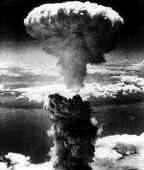Hiroshima and Nagasaki Remembered

On August 6, 1945, 60 years ago to this date, an atomic bomb code named "Little Boy" was detonated above Hiroshima, killing some 130,000 almost instantly and reducing the once vibrant city to a pile of rubble. The death toll by the end of 1945 had risen to an estimated 140,000 people.
Three days later, a similar device code named "Fat Man" was delivered to Nagasaki. Whilst the blast was more powerful than the Hiroshima explosion, geographical factors limited the numbers of immediate victims in Nagasaki to some 90,000.

Even today, soul searching regarding the use of the atomic bombs is still ongoing, with many arguing that the use of these first weapons of mass destruction without warning by the US was unnecessarily cruel.
It’s easy to point the finger of blame when destruction at such scale is meted out so swiftly. But we shouldn’t forget a few basic facts when judging President Truman’s decision to authorise the use of atomic power against Japan.
Firstly, the Japan had no plans for capitulation whatsoever. It had previously ignored the Potsdam proposal. Japan’s policy was to fight to the death, in a way difficult to imagine for Western minds.
An invasion of the home islands would cost an estimated 250,000 to 1,000,000 American lives, as well as who knows how many Japanese lives.
After the bomb had been dropped on Hiroshima, the Japanese stance on surrender hardly changed at all. The Japanese High Command was convinced that the US had used their only bomb. Also, it was argued that if the US had another bomb they wouldn’t risk international condemnation by using a weapon of mass destruction for the second time.
Wrong again. Three days after Little Boy, it was Fat Man’s turn to unleash its nuclear fire on Nagasaki. Again, Japan’s position didn’t really change dramatically and it took an extraordinary intervention by Emperor Hirohito to persuade Japan’s military High Command to accept the terms of surrender (albeit slightly modified with respect to Potsdam).
Some argue that the Soviet Union’s decision to invade Manchuria, thereby effectively joining the war against Japan, made a contribution to Japan’s decision to finally lay down arms and it may well be so.
But I remain convinced that the use of the bombs was not only justified, it also brought the war to an end and ultimately saved many lives on both sides of the conflict.
It may now more than ever be fashionable to exercise some kind of revisionism based on well meant feelings for Hiroshima and Nagasaki's victims, but it doesn't change the finer points of the policies of war, as outlined rather
brilliantly and with a tremendous amount of detail by Michael Turton in this blog entry. Read it and see if afterwards you still feel the a-bombings were an "experiment" or even a "crime" as so many still seem to believe.
Keywords: Hiroshima, Nagasaki, Little Boy, Fat Man, atomic bomb


0 Comments:
Post a Comment
<< Home